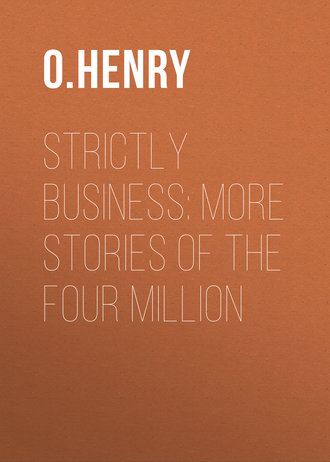 полная версия
полная версияStrictly Business: More Stories of the Four Million
Out of this sightseeing delegations of good King Teddy's Gentlemen of the Royal Bear-hounds dropped one Greenbrier Nye, of Pin Feather, Ariz.
The daily cyclone of Sixth Avenue's rush hour swept him away from the company of his pardners true. The dust from a thousand rustling skirts filled his eyes. The mighty roar of trains rushing across the sky deafened him. The lightning-flash of twice ten hundred beaming eyes confused his vision.
The storm was so sudden and tremendous that Greenbrier's first impulse was to lie down and grab a root. And then he remembered that the disturbance was human, and not elemental; and he backed out of it with a grin into a doorway.
The reporters had written that but for the wide-brimmed hats the West was not visible upon these gauchos of the North. Heaven sharpen their eyes! The suit of black diagonal, wrinkled in impossible places; the bright blue four-in-hand, factory tied; the low, turned-down collar, pattern of the days of Seymour and Blair, white glazed as the letters on the window of the open-day-and-night-except-Sunday restaurants; the out-curve at the knees from the saddle grip; the peculiar spread of the half-closed right thumb and fingers from the stiff hold upon the circling lasso; the deeply absorbed weather tan that the hottest sun of Cape May can never equal; the seldom-winking blue eyes that unconsciously divided the rushing crowds into fours, as though they were being counted out of a corral; the segregated loneliness and solemnity of expression, as of an Emperor or of one whose horizons have not intruded upon him nearer than a day's ride – these brands of the West were set upon Greenbrier Nye. Oh, yes; he wore a broad-brimmed hat, gentle reader – just like those the Madison Square Post Office mail carriers wear when they go up to Bronx Park on Sunday afternoons.
Suddenly Greenbrier Nye jumped into the drifting herd of metropolitan cattle, seized upon a man, dragged him out of the stream and gave him a buffet upon his collar-bone that sent him reeling against a wall.
The victim recovered his hat, with the angry look of a New Yorker who has suffered an outrage and intends to write to the Trib. about it. But he looked at his assailant, and knew that the blow was in consideration of love and affection after the manner of the West, which greets its friends with contumely and uproar and pounding fists, and receives its enemies in decorum and order, such as the judicious placing of the welcoming bullet demands.
"God in the mountains!" cried Greenbrier, holding fast to the foreleg of his cull. "Can this be Longhorn Merritt?"
The other man was – oh, look on Broadway any day for the pattern – business man – latest rolled-brim derby – good barber, business, digestion and tailor.
"Greenbrier Nye!" he exclaimed, grasping the hand that had smitten him. "My dear fellow! So glad to see you! How did you come to – oh, to be sure – the inaugural ceremonies – I remember you joined the Rough Riders. You must come and have luncheon with me, of course."
Greenbrier pinned him sadly but firmly to the wall with a hand the size, shape and color of a McClellan saddle.
"Longy," he said, in a melancholy voice that disturbed traffic, "what have they been doing to you? You act just like a citizen. They done made you into an inmate of the city directory. You never made no such Johnny Branch execration of yourself as that out on the Gila. 'Come and have lunching with me!' You never defined grub by any such terms of reproach in them days."
"I've been living in New York seven years," said Merritt. "It's been eight since we punched cows together in Old Man Garcia's outfit. Well, let's go to a café, anyhow. It sounds good to hear it called 'grub' again."
They picked their way through the crowd to a hotel, and drifted, as by a natural law, to the bar.
"Speak up," invited Greenbrier.
"A dry Martini," said Merritt.
"Oh, Lord!" cried Greenbrier; "and yet me and you once saw the same pink Gila monsters crawling up the walls of the same hotel in Cañon Diablo! A dry – but let that pass. Whiskey straight – and they're on you."
Merritt smiled, and paid.
They lunched in a small extension of the dining room that connected with the café. Merritt dexterously diverted his friend's choice, that hovered over ham and eggs, to a purée of celery, a salmon cutlet, a partridge pie and a desirable salad.
"On the day," said Greenbrier, grieved and thunderous, "when I can't hold but one drink before eating when I meet a friend I ain't seen in eight years at a 2 by 4 table in a thirty-cent town at 1 o'clock on the third day of the week, I want nine broncos to kick me forty times over a 640-acre section of land. Get them statistics?"
"Right, old man," laughed Merritt. "Waiter, bring an absinthe frappé and – what's yours, Greenbrier?"
"Whiskey straight," mourned Nye. "Out of the neck of a bottle you used to take it, Longy – straight out of the neck of a bottle on a galloping pony – Arizona redeye, not this ab – oh, what's the use? They're on you."
Merritt slipped the wine card under his glass.
"All right. I suppose you think I'm spoiled by the city. I'm as good a Westerner as you are, Greenbrier; but, somehow, I can't make up my mind to go back out there. New York is comfortable – comfortable. I make a good living, and I live it. No more wet blankets and riding herd in snowstorms, and bacon and cold coffee, and blowouts once in six months for me. I reckon I'll hang out here in the future. We'll take in the theatre to-night, Greenbrier, and after that we'll dine at – "
"I'll tell you what you are, Merritt," said Greenbrier, laying one elbow in his salad and the other in his butter. "You are a concentrated, effete, unconditional, short-sleeved, gotch-eared Miss Sally Walker. God made you perpendicular and suitable to ride straddle and use cuss words in the original. Wherefore you have suffered his handiwork to elapse by removing yourself to New York and putting on little shoes tied with strings, and making faces when you talk. I've seen you rope and tie a steer in 42½. If you was to see one now you'd write to the Police Commissioner about it. And these flapdoodle drinks that you inoculate your system with – these little essences of cowslip with acorns in 'em, and paregoric flip – they ain't anyways in assent with the cordiality of manhood. I hate to see you this way."
"Well, Mr. Greenbrier," said Merritt, with apology in his tone, "in a way you are right. Sometimes I do feel like I was being raised on the bottle. But, I tell you, New York is comfortable – comfortable. There's something about it – the sights and the crowds, and the way it changes every day, and the very air of it that seems to tie a one-mile-long stake rope around a man's neck, with the other end fastened somewhere about Thirty-fourth Street. I don't know what it is."
"God knows," said Greenbrier sadly, "and I know. The East has gobbled you up. You was venison, and now you're veal. You put me in mind of a japonica in a window. You've been signed, sealed and diskivered. Requiescat in hoc signo. You make me thirsty."
"A green chartreuse here," said Merritt to the waiter.
"Whiskey straight," sighed Greenbrier, "and they're on you, you renegade of the round-ups."
"Guilty, with an application for mercy," said Merritt. "You don't know how it is, Greenbrier. It's so comfortable here that – "
"Please loan me your smelling salts," pleaded Greenbrier. "If I hadn't seen you once bluff three bluffers from Mazatzal City with an empty gun in Phoenix – "
Greenbrier's voice died away in pure grief.
"Cigars!" he called harshly to the waiter, to hide his emotion.
"A pack of Turkish cigarettes for mine," said Merritt.
"They're on you," chanted Greenbrier, struggling to conceal his contempt.
At seven they dined in the Where-to-Dine-Well column.
That evening a galaxy had assembled there. Bright shone the lights o'er fair women and br – let it go, anyhow – brave men. The orchestra played charmingly. Hardly had a tip from a diner been placed in its hands by a waiter when it would burst forth into soniferousness. The more beer you contributed to it the more Meyerbeer it gave you. Which is reciprocity.
Merritt put forth exertions on the dinner. Greenbrier was his old friend, and he liked him. He persuaded him to drink a cocktail.
"I take the horehound tea," said Greenbrier, "for old times' sake. But I'd prefer whiskey straight. They're on you."
"Right!" said Merritt. "Now, run your eye down that bill of fare and see if it seems to hitch on any of these items."
"Lay me on my lava bed!" said Greenbrier, with bulging eyes. "All these specimens of nutriment in the grub wagon! What's this? Horse with the heaves? I pass. But look along! Here's truck for twenty round-ups all spelled out in different directions. Wait till I see."
The viands ordered, Merritt turned to the wine list.
"This Medoc isn't bad," he suggested.
"You're the doc," said Greenbrier. "I'd rather have whiskey straight. It's on you."
Greenbrier looked around the room. The waiter brought things and took dishes away. He was observing. He saw a New York restaurant crowd enjoying itself.
"How was the range when you left the Gila?" asked Merritt.
"Fine," said Greenbrier. "You see that lady in the red speckled silk at that table. Well, she could warm over her beans at my campfire. Yes, the range was good. She looks as nice as a white mustang I see once on Black River."
When the coffee came, Greenbrier put one foot on the seat of the chair next to him.
"You said it was a comfortable town, Longy," he said, meditatively. "Yes, it's a comfortable town. It's different from the plains in a blue norther. What did you call that mess in the crock with the handle, Longy? Oh, yes, squabs in a cash roll. They're worth the roll. That white mustang had just such a way of turning his head and shaking his mane – look at her, Longy. If I thought I could sell out my ranch at a fair price, I believe I'd —
"Gyar – song!" he suddenly cried, in a voice that paralyzed every knife and fork in the restaurant.
The waiter dived toward the table.
"Two more of them cocktail drinks," ordered Greenbrier.
Merritt looked at him and smiled significantly.
"They're on me," said Greenbrier, blowing a puff of smoke to the ceiling.
X
THE UNKNOWN QUANTITY
The poet Longfellow – or was it Confucius, the inventor of wisdom? – remarked:
"Life is real, life is earnest; And things are not what they seem."As mathematics are – or is: thanks, old subscriber! – the only just rule by which questions of life can be measured, let us, by all means, adjust our theme to the straight edge and the balanced column of the great goddess Two-and-Two-Makes-Four. Figures – unassailable sums in addition – shall be set over against whatever opposing element there may be.
A mathematician, after scanning the above two lines of poetry, would say: "Ahem! young gentlemen, if we assume that X plus – that is, that life is real – then things (all of which life includes) are real. Anything that is real is what it seems. Then if we consider the proposition that 'things are not what they seem,' why – "
But this is heresy, and not poesy. We woo the sweet nymph Algebra; we would conduct you into the presence of the elusive, seductive, pursued, satisfying, mysterious X.
Not long before the beginning of this century, Septimus Kinsolving, an old New Yorker, invented an idea. He originated the discovery that bread is made from flour and not from wheat futures. Perceiving that the flour crop was short, and that the Stock Exchange was having no perceptible effect on the growing wheat, Mr. Kinsolving cornered the flour market.
The result was that when you or my landlady (before the war she never had to turn her hand to anything; Southerners accommodated) bought a five-cent loaf of bread you laid down an additional two cents, which went to Mr. Kinsolving as a testimonial to his perspicacity.
A second result was that Mr. Kinsolving quit the game with $2,000,000 prof – er – rake-off.
Mr. Kinsolving's son Dan was at college when the mathematical experiment in breadstuffs was made. Dan came home during vacation, and found the old gentleman in a red dressing-gown reading "Little Dorrit" on the porch of his estimable red brick mansion in Washington Square. He had retired from business with enough extra two-cent pieces from bread buyers to reach, if laid side by side, fifteen times around the earth and lap as far as the public debt of Paraguay.
Dan shook hands with his father, and hurried over to Greenwich Village to see his old high-school friend, Kenwitz. Dan had always admired Kenwitz. Kenwitz was pale, curly-haired, intense, serious, mathematical, studious, altruistic, socialistic, and the natural foe of oligarchies. Kenwitz had foregone college, and was learning watch-making in his father's jewelry store. Dan was smiling, jovial, easy-tempered and tolerant alike of kings and ragpickers. The two foregathered joyously, being opposites. And then Dan went back to college, and Kenwitz to his mainsprings – and to his private library in the rear of the jewelry shop.
Four years later Dan came back to Washington Square with the accumulations of B. A. and two years of Europe thick upon him. He took a filial look at Septimus Kinsolving's elaborate tombstone in Greenwood and a tedious excursion through typewritten documents with the family lawyer; and then, feeling himself a lonely and hopeless millionaire, hurried down to the old jewelry store across Sixth Avenue.
Kenwitz unscrewed a magnifying glass from his eye, routed out his parent from a dingy rear room, and abandoned the interior of watches for outdoors. He went with Dan, and they sat on a bench in Washington Square. Dan had not changed much; he was stalwart, and had a dignity that was inclined to relax into a grin. Kenwitz was more serious, more intense, more learned, philosophical and socialistic.
"I know about it now," said Dan, finally. "I pumped it out of the eminent legal lights that turned over to me poor old dad's collections of bonds and boodle. It amounts to $2,000,000, Ken. And I am told that he squeezed it out of the chaps that pay their pennies for loaves of bread at little bakeries around the corner. You've studied economics, Dan, and you know all about monopolies, and the masses, and octopuses, and the rights of laboring people. I never thought about those things before. Football and trying to be white to my fellow-man were about the extent of my college curriculum.
"But since I came back and found out how dad made his money I've been thinking. I'd like awfully well to pay back those chaps who had to give up too much money for bread. I know it would buck the line of my income for a good many yards; but I'd like to make it square with 'em. Is there any way it can be done, old Ways and Means?"
Kenwitz's big black eyes glowed fierily. His thin, intellectual face took on almost a sardonic cast. He caught Dan's arm with the grip of a friend and a judge.
"You can't do it!" he said, emphatically. "One of the chief punishments of you men of ill-gotten wealth is that when you do repent you find that you have lost the power to make reparation or restitution. I admire your good intentions, Dan, but you can't do anything. Those people were robbed of their precious pennies. It's too late to remedy the evil. You can't pay them back"
"Of course," said Dan, lighting his pipe, "we couldn't hunt up every one of the duffers and hand 'em back the right change. There's an awful lot of 'em buying bread all the time. Funny taste they have – I never cared for bread especially, except for a toasted cracker with the Roquefort. But we might find a few of 'em and chuck some of dad's cash back where it came from. I'd feel better if I could. It seems tough for people to be held up for a soggy thing like bread. One wouldn't mind standing a rise in broiled lobsters or deviled crabs. Get to work and think, Ken. I want to pay back all of that money I can."
"There are plenty of charities," said Kenwitz, mechanically.
"Easy enough," said Dan, in a cloud of smoke. "I suppose I could give the city a park, or endow an asparagus bed in a hospital. But I don't want Paul to get away with the proceeds of the gold brick we sold Peter. It's the bread shorts I want to cover, Ken."
The thin fingers of Kenwitz moved rapidly.
"Do you know how much money it would take to pay back the losses of consumers during that corner in flour?" he asked.
"I do not." said Dan, stoutly. "My lawyer tells me that I have two millions."
"If you had a hundred millions," said Kenwitz, vehemently, "you couldn't repair a thousandth part of the damage that has been done. You cannot conceive of the accumulated evils produced by misapplied wealth. Each penny that was wrung from the lean purses of the poor reacted a thousandfold to their harm. You do not understand. You do not see how hopeless is your desire to make restitution. Not in a single instance can it be done."
"Back up, philosopher!" said Dan. "The penny has no sorrow that the dollar cannot heal."
"Not in one instance," repeated Kenwitz. "I will give you one, and let us see. Thomas Boyne had a little bakery over there in Varick Street. He sold bread to the poorest people. When the price of flour went up he had to raise the price of bread. His customers were too poor to pay it, Boyne's business failed and he lost his $1,000 capital – all he had in the world."
Dan Kinsolving struck the park bench a mighty blow with his fist.
"I accept the instance," he cried. "Take me to Boyne. I will repay his thousand dollars and buy him a new bakery."
"Write your check," said Kenwitz, without moving, "and then begin to write checks in payment of the train of consequences. Draw the next one for $50,000. Boyne went insane after his failure and set fire to the building from which he was about to be evicted. The loss amounted to that much. Boyne died in an asylum."
"Stick to the instance," said Dan. "I haven't noticed any insurance companies on my charity list."
"Draw your next check for $100,000," went on Kenwitz. "Boyne's son fell into bad ways after the bakery closed, and was accused of murder. He was acquitted last week after a three years' legal battle, and the state draws upon taxpayers for that much expense."
"Back to the bakery!" exclaimed Dan, impatiently. "The Government doesn't need to stand in the bread line."
"The last item of the instance is – come and I will show you," said Kenwitz, rising.
The Socialistic watchmaker was happy. He was a millionaire-baiter by nature and a pessimist by trade. Kenwitz would assure you in one breath that money was but evil and corruption, and that your brand-new watch needed cleaning and a new ratchet-wheel.
He conducted Kinsolving southward out of the square and into ragged, poverty-haunted Varick Street. Up the narrow stairway of a squalid brick tenement he led the penitent offspring of the Octopus. He knocked on a door, and a clear voice called to them to enter.
In that almost bare room a young woman sat sewing at a machine. She nodded to Kenwitz as to a familiar acquaintance. One little stream of sunlight through the dingy window burnished her heavy hair to the color of an ancient Tuscan's shield. She flashed a rippling smile at Kenwitz and a look of somewhat flustered inquiry.
Kinsolving stood regarding her clear and pathetic beauty in heart-throbbing silence. Thus they came into the presence of the last item of the Instance.
"How many this week, Miss Mary?" asked the watchmaker. A mountain of coarse gray shirts lay upon the floor.
"Nearly thirty dozen," said the young woman cheerfully. "I've made almost $4. I'm improving, Mr. Kenwitz. I hardly know what to do with so much money." Her eyes turned, brightly soft, in the direction of Dan. A little pink spot came out on her round, pale cheek.
Kenwitz chuckled like a diabolic raven.
"Miss Boyne," he said, "let me present Mr. Kinsolving, the son of the man who put bread up five years ago. He thinks he would like to do something to aid those who where inconvenienced by that act."
The smile left the young woman's face. She rose and pointed her forefinger toward the door. This time she looked Kinsolving straight in the eye, but it was not a look that gave delight.
The two men went down Varick Street. Kenwitz, letting all his pessimism and rancor and hatred of the Octopus come to the surface, gibed at the moneyed side of his friend in an acrid torrent of words. Dan appeared to be listening, and then turned to Kenwitz and shook hands with him warmly.
"I'm obliged to you, Ken, old man," he said, vaguely – "a thousand times obliged."
"Mein Gott! you are crazy!" cried the watchmaker, dropping his spectacles for the first time in years.
Two months afterward Kenwitz went into a large bakery on lower Broadway with a pair of gold-rimmed eyeglasses that he had mended for the proprietor.
A lady was giving an order to a clerk as Kenwitz passed her.
"These loaves are ten cents," said the clerk.
"I always get them at eight cents uptown," said the lady. "You need not fill the order. I will drive by there on my way home."
The voice was familiar. The watchmaker paused.
"Mr. Kenwitz!" cried the lady, heartily. "How do you do?"
Kenwitz was trying to train his socialistic and economic comprehension on her wonderful fur boa and the carriage waiting outside.
"Why, Miss Boyne!" he began.
"Mrs. Kinsolving," she corrected. "Dan and I were married a month ago."
XI
THE THING'S THE PLAY
Being acquainted with a newspaper reporter who had a couple of free passes, I got to see the performance a few nights ago at one of the popular vaudeville houses.
One of the numbers was a violin solo by a striking-looking man not much past forty, but with very gray thick hair. Not being afflicted with a taste for music, I let the system of noises drift past my ears while I regarded the man.
"There was a story about that chap a month or two ago," said the reporter. "They gave me the assignment. It was to run a column and was to be on the extremely light and joking order. The old man seems to like the funny touch I give to local happenings. Oh, yes, I'm working on a farce comedy now. Well, I went down to the house and got all the details; but I certainly fell down on that job. I went back and turned in a comic write-up of an east side funeral instead. Why? Oh, I couldn't seem to get hold of it with my funny hooks, somehow. Maybe you could make a one-act tragedy out of it for a curtain-raiser. I'll give you the details."
After the performance my friend, the reporter, recited to me the facts over the Würzburger.
"I see no reason," said I, when he had concluded, "why that shouldn't make a rattling good funny story. Those three people couldn't have acted in a more absurd and preposterous manner if they had been real actors in a real theatre. I'm really afraid that all the stage is a world, anyhow, and all the players men and women. 'The thing's the play,' is the way I quote Mr. Shakespeare."
"Try it," said the reporter.
"I will," said I; and I did, to show him how he could have made a humorous column of it for his paper.
There stands a house near Abingdon Square. On the ground floor there has been for twenty-five years a little store where toys and notions and stationery are sold.
One night twenty years ago there was a wedding in the rooms above the store. The Widow Mayo owned the house and store. Her daughter Helen was married to Frank Barry. John Delaney was best man. Helen was eighteen, and her picture had been printed in a morning paper next to the headlines of a "Wholesale Female Murderess" story from Butte, Mont. But after your eye and intelligence had rejected the connection, you seized your magnifying glass and read beneath the portrait her description as one of a series of Prominent Beauties and Belles of the lower west side.
Frank Barry and John Delaney were "prominent" young beaux of the same side, and bosom friends, whom you expected to turn upon each other every time the curtain went up. One who pays his money for orchestra seats and fiction expects this. That is the first funny idea that has turned up in the story yet. Both had made a great race for Helen's hand. When Frank won, John shook his hand and congratulated him – honestly, he did.


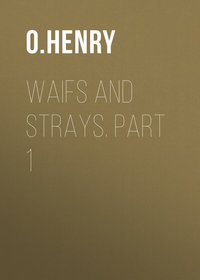
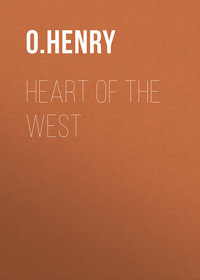

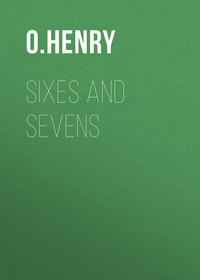
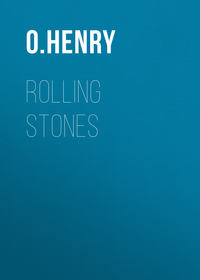


![Heart of the West [Annotated]](/covers_200/25561004.jpg)